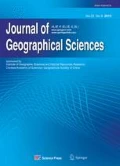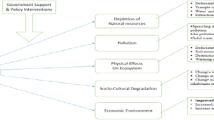Abstract
The scientific environmental ethics plays a key role in the recognition of the human- environment interactions. Modern environmental ethics is the philosophical re-thinking of modern human race environmental behavior. The development of environmental ethics theory, as well as its application in reality, determines the viewpoints of environmental ethics. Sustainable development implies harmony on human-environment interactions and inter- generation responsibility, with emphasis on a harmonious relationship among population, resources, environment and development, so as to lay a sustainable and healthy foundation of resources and environment for future generations. The harmonious society construction in China that is raised by the Chinese central government should be covered by environmental ethics. The connotation of open environmental ethics includes a respect for nature, care for the individual human race, and respect for the development of future generations, which means giving consideration to natural values, individual and human race benefits and welfare across generations. The role of environmental ethics in regional development consists of cognition, criticism, education, inspiration, adjusting, legislation and promoting environmental regulations. The major problems in regional development are extensive resource exploration, fast population growth, irrational industrial structure, unfair welfare distribution and the twofold effects of science and technology development. The formulation of environmental ethics that aims at regional sustainable development, can not only harmonize the relationship of population, resource, environment and economic development, but also guide behavior selection, push social and political system transformation, strengthen the legal system, and raise environmental awareness of the public.
Similar content being viewed by others
References
Leopold H, 1968. A Sand County Almanac and Sketches Here and There. London and Oxford: Oxford University Press, 1–256.
Qi Jun, Yang Linsheng, Wang Wuyi, 2007. Environmental degradation and health risks in Beijing, China. Archives of Environmental Health, 62(1): 33–37.
Rolston H, 1988. Environmental Ethics. Duties to and Value in the Natural World. Temple University Press, 1–5.
Wang Guopin, 2004a. The major norms for environmental morality. Environment and Society, 7(1): 8–27. (in Chinese)
Wang Guopin, 2004b. The major norms for environmental morality (Continued). Environment and Society, 7(2): 16–29. (in Chinese)
Wang Tao (Chief Editor), 2003. Desert and Desertification in China. Shijiazhuang: Hebei Science & Technology Publishing House, 619–639. (in Chinese)
Wu Shaohong, Dai Erfu, Zheng Du et al, 2007. Case study on environmental ethics in sustainable regional development: Responsibilities for different communities. Geographical Research, 26(6): 1109–1116. (in Chinese)
Yang Tongjin, 1999. Conformity and surmounting: The non-anthropocentrism directive environmental ethics. In: Xu Songling eds. Progress on Environmental Ethics: Comments and Explanation. Beijing: China Social Science Press, 15–70. (in Chinese)
Yu Mouchang, 1994. Go beyond anthropocentrism. Studies in Dialectics of Nature, 10(7): 8–14. (in Chinese)
Zheng Du, 2002. Prospects of studies on man-land relationship in the 21st century. Geographical Research, 21(1): 9–13. (in Chinese)
Zheng Du, 2005a. Issues of environmental ethics in regional sustainable development. Geographical Research, 24(2): 161–168. (in Chinese)
Zheng Du, 2005b. Man-land relationship and environmental ethics. Journal of Yunnan Normal University, 37(3): 2–6. (in Chinese)
Author information
Authors and Affiliations
Corresponding author
Additional information
Foundation: National Natural Science Foundation of China, No.41071060; No.40701009; No.40830741; National Key Technology R&D Program, No.2008BAH31B01; Key Project of Knowledge Innovation Program of the Chinese Academy of Sciences, No.KZCX2-YW-322-5
Author: Zheng Du (1936–), Professor and CAS Academician, specialized in physical geography integration.
Rights and permissions
About this article
Cite this article
Zheng, D., Dai, E. Environmental ethics and regional sustainable development. J. Geogr. Sci. 22, 86–92 (2012). https://doi.org/10.1007/s11442-012-0913-6
Received:
Accepted:
Published:
Issue Date:
DOI: https://doi.org/10.1007/s11442-012-0913-6




